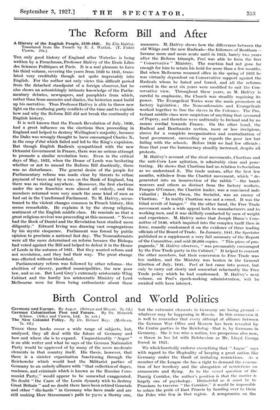The Reform Bill and After
THF‘ only good history of England after Waterloo is being written by a Frenchman, Professor Halevy of the Ecole Libre des Sciences Politiques at Paris. It is a real pleasure to have his third volume, covering the years from 1830 to 1841, trans- lated very creditably though not quite impeccably into English. For the author not only views this difficult period from the detached standpoint of a foreign observer, but he also shows an astonishingly intimate knowledge of the Parlia- mentary debates, newspapers, and pamphlets from which, rather than from memoirs and diaries, the historian must build up his narrative. Thus Professor Halevy is able to throw new light on the confusing party conflicts of the time and to explain how and why the Reform Bill did not break the continuity of English history.
It is well known that the French Revolution of July, 1830, had a great influence on the elections then proceeding in England and helped to destroy Wellington's majority, because the Duke was wrongly thought to have encouraged Charles X. in the coup d'etat which failed and led to the King's expulsion. But though English Radicals sympathized with the new Orleanist Government in France, there was no serious attempt to promote a similar revolution here. Even in the critical days of May, 1832, when the House of Lords was hesitating whether or not to amend the Reform Bill drastically, there was no disturbance. The general desire of the people for Parliamentary reform was made clear by threats to refuse payment of taxes and by a run on the Bank of England, but there was no rioting anywhere. Moreover, the first elections under the new franchise were almost all orderly, and the members returned were very much the same kind of men as had sat in the Unreformed Parliament. To M. Halevy, accus- tomed to the violent changes common in French history, this seems remarkable. He explains it by the strong religious sentiment of the English middle class. He reminds us that a great religious revival was proceeding at this moment. " Never had the Book of Daniel and the Revelation been studied more diligently." Edward Irving was drawing vast congregations by his mystic eloquence. Parliament was forced by public opinion to proclaim a national fast day. The Nonconformists were all the more determined on reform because the Bishops had voted against the Bill and helped to defeat it in the House of Lords in the autumn of 1831. But they wanted reform and not revolution, and they had their way. The great ehange was effected without bloodshed.
Parliamentary reform was followed by other reforms--the abolition of slavery, purified municipalities, the new poor law, and so on. But Lord Grey's extremely aristocratic Whig Cabinet and the hardly less aristocratic Ministry of Lord Melbourne were far from being enthusiastic about these measures. M. Halevy shows how the differences between the old Whigs and the new Radicals—the followers of Bentham— became more and more acute until in 1834, barely two years after the Reform triumph, Peel was able to form the first " Conservative " Ministry. The reaction had not gone far enough for him to retain his hold for more than a few months. But when Melbourne resumed office in the spring of 1835 he was virtually dependent on Conservative support against the Radicals whom he hated and feared, and all the reforms carried in the next six years were modified to suit the Con- servative view. Throughout these years, as M. Halevy is careful to emphasize, the Church was steadily regaining its power. The Evangelical Tories were the main promoters of factory legislation ; the Nonconformists and Evangelicals worked together to free the slaves in the Colonies. The Pro_ testant middle class were suspicious of anything that savoured of Popery, and therefore were unfriendly to Ireland and by no means cordial towards France. On the other hand, the Radical and Benthamite section, more or less irreligious, strove for a complete reorganization and centralization of local government, succeeding as regards the poor law but failing with the schools. Before 1830 we had few officials ; from that year the bureaucracy steadily increased, despite all protests.
M. Halevy's account of the rival movements, Chartism and the anti-Corn Law agitation, is admirably clear and pene- trating. He shows that Chartism had no relation to Socialism as we understand it. The trade unions, after the first few months, withdrew from the Chartist movement, which " de- generated into an insurrection of the rabble "—the hand- weavers and others as distinct from the factory workers. Feargus O'Connor, the Chartist leader, was a convinced indi- vidualist ; Robert Owen, the Socialist, was an enemy of Chartism. " In reality Chartism was not a creed. It was the blind revolt of hunger." On the other hand, the Free Trade movement made a wide appeal both to manufacturers and to working men, and it was skilfully conducted by men of weight and experience. M. Halevy notes that Joseph Hume's Com- mittee of 1840, which inquired into the complex tariff then in force, roundly condemned it on the evidence of three leading officials of the Board of Trade. In January, 1841, the Spectator published as a supplement a very full summary of the Report of the Committee, and sold 30,000 copies. " This piece of pro- paganda," M. Hitlevy observes, " was presumably encouraged by the Free Trade party in the Cabinet." It helped to convert the other members, but their conversion to Free Trade was too sudden, and the Ministry was beaten in the General Election of July, 1841. Peel at last came into power, but only to carry out slowly and somewhat reluctantly the Free Trade policy which he had condemned. M. Halevy's next volume, on Peel's epoch-making administration, will be awaited with keen interest.










































 Previous page
Previous page